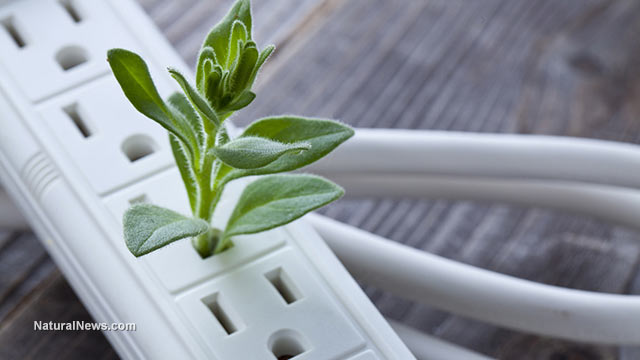Plants may be the secret to unlocking large scale, affordable energy for humanity
Thursday, August 18, 2016 by: Amy Goodrich
Tags: green energy, electricity storage, batteries

(NaturalNews) A new era of renewable energy and energy storage is upon us. Scientists from Harvard University have discovered how to create an entirely new class of non-toxic, high-capacity flow batteries to store electricity from solar and wind power.
Inspired by vitamin B2 (or riboflavin), the Harvard researchers identified a new class of organic molecules found in a variety of plants that can safely store electricity from intermittent energy sources. This new cutting-edge technology is based on earlier work in which they developed a high-capacity flow battery that stores energy in organic molecules called quinones and a food additive called ferrocyanide.
While these quinone-based batteries showed great results, the Harvard scientists continued to explore other organic molecules to improve material and performance.
Kaixiang Lin, a Ph.D. student at Harvard and first author of the paper, said that after looking at a great number of different quinones, they finally found a new class of battery electrolyte material that expands the possibilities of what they can do. They are easily synthesized, which means that they could be manufactured on a large scale and at a very low cost – two crucial factors to making the project a success.
Cheap, safe and biodegradable energy storage
In 2014, the scientists were able to replace toxic metal ions used as conventional battery electrolytes in an acidic solution with quinones. Quinones are molecules that store energy in a wide variety of plants. In 2015, they updated the system and found one particular quinone that was able to store energy in an alkaline solution alongside a common food additive, ferrocyanide.In their most recent research, published in Nature Energy, they modified the vitamin B2 molecule, which is used by the human body to store energy from the food we eat.
"We designed these molecules to suit the needs of our battery, but really it was nature that hinted at this way to store energy," said Gordon, co-senior author of the paper. "Nature came up with similar molecules that are very important in storing energy in our bodies."
As reported by Michael J. Aziz, the Gene and Tracy Sykes Professor of Materials and Energy Technologies at the Harvard John A. Paulson School of Engineering and Applied Sciences, a couple of tweaks to the original B2 molecule enabled the team to make a new group of molecules suitable for alkaline flow batteries. These batteries have a high stability and solubility, while providing high battery voltage and storage capacity.
He further noted that vitamins are relatively easy to produce, which will make it feasible to manufacture the batteries on a large scale and at a very low cost. Speaking to the Daily Telegraph, Professor Aziz said that this new technology has the potential to bring the energy storage cost down to $100 per kWh, which is about half of the current storage cost.
And because the battery's key components (water and non-toxic organic chemicals) are biodegradable, this new technology is environmentally friendly and doesn't form any potential hazard in the case of an accident or when the battery needs to be decommissioned or recycled.
While the team is still struggling with the "calendar life" of the chemicals used in the storage tanks, the design has proven its effectiveness. Next year, the first European field tests will be conducted by utility companies partnering with Italy's Green Energy Storage, the holder of the European license for Harvard's organic flow battery.
In the meantime, the team will continue its groundbreaking research to further explore the possibilities of quinones, as well as a new universe of other energy storing molecules, in pursuit of a high-performing, long-lasting and inexpensive flow battery.
Sources for this article include:
OilPrice.com
Nature.com
SEAS.Harvard.edu
Telegraph.co.uk
Green energy at FETCH.news
Get independent news alerts on natural cures, food lab tests, cannabis medicine, science, robotics, drones, privacy and more.
Take Action: Support Natural News by linking to this article from your website
Permalink to this article:
Embed article link: (copy HTML code below):
Reprinting this article:
Non-commercial use OK, cite NaturalNews.com with clickable link.
Follow Natural News on Facebook, Twitter, Google Plus, and Pinterest
- Newly released JFK files reveal Pentagon's role in creating Lyme disease and covid in the same lab
- Discovery of vast underground city beneath Giza pyramids challenges human history
- Black cumin seed oil emerges as a powerful ally against breast cancer and chronic inflammation
- Sugar-free deception: Artificial sweeteners hijack hunger signals, fuel obesity epidemic, study warns
- Kiss Your Genetic Privacy Good-Bye! 23andMe Gets Green Light to Sell Your Intimate Genetic Details to Anyone They Want
- Aluminum pollution: A silent threat to human health
- Dr. Suzanne Humphries makes bombshell appearance on Joe Rogan podcast, exposing vaccine industry deception back to POLIOMYELITIS
- Sweden's migrant crisis deepens as failed green energy venture leaves thousands jobless, exposes systemic collapse
- Is the vaccine-autism debate reopening? Washington Post sparks controversy with preemptive hit piece on David Geier
- The mighty Eggplant: An underrated superfood with ancient roots
- Analysis: The coming economic collapse, a mass uprising and Trump's three secret weapons to halt the growing revolt
- A handful of pecans a day could keep heart disease at bay, study finds
- The great crypto power struggle: How technocrats and governments are reshaping global finance
- Challenging the status quo: “America Fooled” by Timothy Scott exposes the myths about antidepressants
- RFK Jr. slashes HHS bureaucracy, saves taxpayers $1.8B while refocusing on chronic disease epidemic
- AI breakthrough slashes celiac disease diagnosis time from months to minutes
- Understanding the difference: “Food Allergies and Food Intolerance” by Dr. Jonathan Brostoff and Linda Gamlin
- HIGH-FAT FOOD DEPRESSION: Scientists discover why obesity takes away the pleasure of eating
- Newly released JFK files reveal Pentagon's role in creating Lyme disease and covid in the same lab
- Analysis: The coming economic collapse, a mass uprising and Trump's three secret weapons to halt the growing revolt
- Trump nominates VACCINE ZEALOT Susan Monarez to lead the CDC, sidelining RFK Jr.'s reform efforts
- Trump's greatest betrayal so far: Accelerating Middle East wars, silencing dissent, and serving Zionist masters
- Dr. Mike Yeadon releases 15-minute testimony - WATCH - about genocidal intent of COVID “vaccines”
- Festive flavors: The sweet history, nutritional profile and health benefits of pecan pie
- Elon Musk: Aliens could be here on Earth RIGHT NOW
- Big Pharma's $8 Billion bribery scheme exposed: how doctors are pushed to prescribe junk science, not heal
- 5 Simple steps to boost your brainpower: How to strengthen executive function in a distracted world
- Trump reverses course on Gaza plan, says “nobody is expelling Palestinians”
- A lack of integrity in Academia: Harvard professor found GUILTY of fraudulent research to promote CRT theory
- Reclaim your health: How midlife exercise reverses years of inactivity
- Survival 101: Effective EMF blocking techniques
- Florida takes a stand: DeSantis proposes permanent ban on mRNA vaccine mandates
- Sugarcane extract superior to cholesterol-lowering drugs?
- California's social media censorship law struck down: A victory for free speech or a threat to online safety?
- OpenAI whistleblower who dissented against how the company trained ChatGPT found dead
- EPA advisor admits the agency is funneling billions to climate groups ahead of Trump’s return to White House
- EPA advisor admits the agency is funneling billions to climate groups ahead of Trump’s return to White House
- Newly released JFK files reveal Pentagon's role in creating Lyme disease and covid in the same lab
- California's social media censorship law struck down: A victory for free speech or a threat to online safety?
- Dr. Mike Yeadon releases 15-minute testimony - WATCH - about genocidal intent of COVID “vaccines”
- The Health Ranger releases “Vaccine Zombie” song and music video, using AI-animated zombies for the music video
- The pandemic as a tool for INDOCTRINATION: Understanding “The Indoctrinated Brain” by Dr. Michael Nehls
- Florida takes a stand: DeSantis proposes permanent ban on mRNA vaccine mandates
- “Why we influenced the 2020 elections”: Facebook files reveal the coordinated effort to bury the Hunter Biden laptop story
- Mike Adams releases country western hit single: Goin’ Back in Time is Comin’ Home
- Mike Adams releases music poetry sensation: A Child of God
- Unpacking the Lies That We’ve Been Fed – new song and music video released by Mike Adams, the Health Ranger
- Michigan sheriff announces criminal investigation into 2020 election crimes, Dominion Voting Systems
- Migrants are taking advantage of recent hurricanes to scam residents and loot their homes
- House Intelligence Committee calls for the ARREST and PROSECUTION of Dr. Anthony Fauci
- RFK Jr. clears key hurdle: Sen. Susan Collins backs controversial HHS nominee, signaling a new era for health policy
- Rep. Nancy Mace introduces bill to ban biological males from female facilities on federal property
- Peter Rost exposes Big Pharma corruption in his book “The Whistleblower: Confessions of a Healthcare Hitman”
- Mike Adams releases new song and music video: Nothing More Disgusting Than a Globalist
- Red Cross issues warning to stop blood plasma donations from vaccinated people
- Scientists confirm: GENIUS brain function can be spontaneously unleashed in humans without any apparent cause
- EPA advisor admits the agency is funneling billions to climate groups ahead of Trump’s return to White House
- HYSSOP: What research reveals about the health benefits of this ancient holy herb
- Two containers with completed ballots fall out of truck in Florida
- Fully vaccinated about to see “tsunami” of illness and death, warns virologist
- Global leaders unite to clamp down on “misinformation” with UN-backed Cascais Declaration
- BREAKING: 2025 NDAA authorizes mandatory military draft of WOMEN across America… as Pentagon pursues global NUCLEAR war with both Russia and China at the same time
- Michael Yon warns of a ZIONIST TAKEOVER in Trump’s second administration
- BOMBSHELL: DNA testing kits are a SCAM to develop ethnic-specific bioweapons
- Ozempic and Wegovy weight loss drugs are injectable LIZARD VENOM PEPTIDES that may unleash a devastating wave of organ failure… side effects align with symptoms of SNAKE BITES
- Israeli soldiers accused of even more torture and abuse in the West Bank
- These 13 countries just signed an agreement to engineer a global FAMINE by destroying food supply
- NASA admits that climate change occurs because of changes in Earth’s solar orbit, and NOT because of SUVs and fossil fuels
- RFK Jr. clears key hurdle: Sen. Susan Collins backs controversial HHS nominee, signaling a new era for health policy
- Sermon 30: How Jesus reveals Caesar’s FAKE CURRENCY and FALSE AUTHORITY
- Coriander seeds: Ancient medicine backed by modern science
- Arizona officials claim Maricopa County needs 10-13 days to tabulate results of the election
Science News & Studies
Medicine News and Information
Food News & Studies
Health News & Studies
Herbs News & Information
Pollution News & Studies
Cancer News & Studies
Climate News & Studies
Survival News & Information
Gear News & Information
News covering technology, stocks, hackers, and more



"Big Tech and mainstream media are constantly trying to silence the independent voices that dare to bring you the truth about toxic food ingredients, dangerous medications and the failed, fraudulent science of the profit-driven medical establishment.
Email is one of the best ways to make sure you stay informed, without the censorship of the tech giants (Google, Apple, Facebook, Twitter, YouTube, etc.). Stay informed and you'll even likely learn information that may help save your own life."
–The Health Ranger, Mike Adams












































